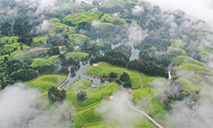Innovative highland barley products make good business
LHASA, May 5 (Xinhua) -- Huge machines make roaring sounds as they complete processes such as magnetic separation and impurity removal. Lhachung walks around the machines while carefully checking highland barley products in a mask and headgear.
The 32-year-old Tibetan is the director of the workshop of Tibet Zangyuan Highland Barley Technology Co., Ltd. in Taktse Disrtict, Lhasa, the capital city of southwest China's Tibet Autonomous Region.
For his hard work and dedication to highland barley research, the man was awarded the title of "national model worker" in 2020.
Highland barley has been planted in southwest China's Tibet Autonomous Region for more than 3,500 years. The wine made from it is a local necessity and the Zanba made of its flour is a staple food for Tibetans to start the day with.
He recalled that in his childhood, his parents used to make highland barley wine. "At that time, traditional highland barley wine was easy to turn black due to improper storage while the wine with can or glass bottle now can be kept longer and transported to other provinces like Sichuan and Jiangsu," said Lhachung.
Lhachung is now making more highland barley products such as rice, flour and strips and introducing highland barley to the whole country and even the world.
"Highland barley rice can be steamed and eaten together with rice. Highland barley flour and milk powder are generally made into small snacks such as milk flakes or biscuits," said Lhachung.
Moreover, highland barley strips have a soft and chewy taste so that people can boil and eat them like Tibetan noodles, or fried rice cakes, he added.
The strips developed by Lhachung and his colleagues are now available in some Tibetan restaurants in Lhasa, and also have potential in foreign markets as it contains Pueraria, a Chinese herb with sugar and lipid-decreasing effects.
"Pueraria soup is widely known and popular in Japan as a herbal medicine for colds," said Kana, a Japanese woman who owns a cafe in Lhasa.
Lhachung's colleague Dorje Palden said that Lhachung always arrived at the factory early and left late at night.
"He is often busy in the factory or in the research and development room for his highland barley products and sometimes couldn't come back home," said Lhachung's wife Padma.
In July 2021, Lhachung began to be in charge of a newly-established innovation studio in his company, focusing on product development.
The company's booming business is also a blessing for local farmers. Since last year, it has purchased more than 1,100 tonnes of highland barley locally at a price of about 5 yuan (about 76 U.S. cents) per kg.
"With more and more highland barley products being sold to places out of the plateau, a larger number of locals will benefit," said Tsongkyi, a trade union official of Taktse Disrtict.
Photos
Related Stories
- China launches new scientific expedition on world's highest peak
- Tibet sees stable foreign trade growth in Q1
- Sound ecology brings better life to people in Nyingchi, Tibet
- Improved roads in rural areas in China’s Tibet benefit local people
- Villagers in Tibet’s Nyingchi become prosperous through rural tourism
Copyright © 2022 People's Daily Online. All Rights Reserved.










